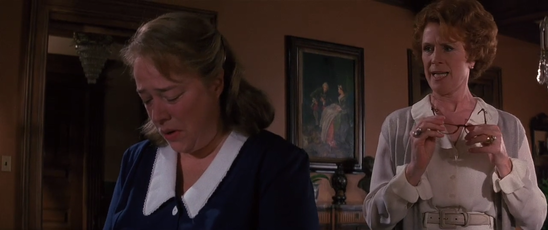by Megan Hess
When most people think "Stephen King," they think spooky and scary, not battered women and small-town domestic drama. Although King started out writing horror novels which often focused heavily on the supernatural, in recent years, he has shifted away from that, instead writing about horrors his readership is more likely to encounter in their lives.
Dolores Claiborne is one of these books. Published in 1993, it tells the story of Dolores Claiborne, a woman isolated from her community for allegedly murdering her abusive, alcoholic husband, thirty years earlier. When the book begins, she has accused again - this time of murdering her longtime employer, the sharp-tongued, senile, Vera Donovan. The 1996 film adaptation written by Tony Gilroy and directed by Taylor Hackford, has the same basic plot as the book, but adds an element absent in the book: the physical presence of Claiborne's adult daughter, Selina (Jennifer Jason Leigh), in real-time. Never one of King's most popular books, unfortunately (probably because it lacks the supernatural creepiness which many longtime fans love) the stellar film adaptation is similarly forgotten by many, when it should be not only remembered, but emulated. Bates named Dolores Claiborne as her favorite role so far from her decades-long career (appropriate, since King wrote the character with Bates in mind after seeing her play sadistic superfan Annie Wilkes in the screen adaptation of his novel Misery (Reiner, 1990). ) Besides the great performances in the film (including a bone-chilling David Strathairn as Dolores' husband, Joe St. George), Dolores Claiborne encapsulates the depth and breadth of the platonic bond between women, and should be listed along with the other greatest female friendship films we have, like Thelma and Louise (Scott, 1991) or Steel Magnolias (Ross, 1989).
Dolores and Vera (Judy Parfitt) have every reason not to be friends, and Dolores has every reason to kill her (not counting the millions Vera left to her in her will). Vera is a high-society lady with even higher standards for the way she wants things done, while Dolores is a working-class woman in her employ. The differing backgrounds and power imbalance almost ensures they will not have a relationship beyond employer\employee, but Dolores is able to meet Vera's demands, and sets herself apart from the other maids working to keep the Donovans' summer home in order - so much so that Vera asks her to keep up the house over the winter season.
When Vera's husband dies in a car accident, she moves from her home in Baltimore to the island house, and has Dolores working for her year-round full-time. Even this does not cause their relationship to shift from purely professional to something more intimate. That comes after Dolores learns from Teenage Selina (Ellen Muth) that Joe has been targeting her sexually.
Dolores plans to go to the bank and withdraw all of the money she has saved up from working for Vera all these years, so that she and Selina can flee Joe, but the escape plan falls flat when she discovers that Joe has emptied the account. When Vera finds her sobbing at work, she gets Dolores to tell her everything, and the relationship between them begins to change. Vera indirectly hints to Dolores that the "car accident" her husband died in was no accident; she killed him for running around on her with other women. She suggests that Dolores does the same to Joe, because "husbands die every day, Dolores...They die...and they leave their wives their money..... An accident can be an unhappy woman's best friend." When Dolores tries to address Vera more formally, as she always has, Vera corrects her and says, "I insist that all women who have hysterics in my drawing room call me by my Christian name." These moments show that Vera trusts Dolores with more than just the state of her home, and even cares about her well-being. She even gives her a piece of advice which gives her the courage to kill Joe, and, afterwards, to hold her head high and continue living and working in the town she grew up in: "Sometimes, being a bitch is the only thing a woman has to hold on to."
Dolores returns the favor later on by moving in with Vera after she has had a stroke and becoming her caretaker. She stays although Vera's moments of lucidity become more infrequent by the day. When the mailman finds Vera in a tumble at the bottom of the stairs and Dolores standing over her with a rolling pin, he assumes that Dolores threw her elderly charge down the stairs and then grabbed the rolling pin to finish her off. This hypothesis looks more likely when the investigators find out that, according to Vera's will made eight years before her death, Dolores will inherit everything she owned. However, Selina uses the strong bond between the two women to prove that her mother did not kill Vera Donovan. This leads Dolores to tell them the truth: sick of being infirm and insane, Vera pitched herself down the stairs. When Dolores tried to save her, she begged Dolores to finish her off, but died before Dolores could strike the killing blow. (She had no idea about the inheritance.)
Whether or not Dolores could have gone through with assisting Vera in ending her life if uninterrupted is up for debate. On one side of the argument, her devotion to Vera Donovan had caused her to do many unpleasant tasks over the years. Ending her pain would be just one more - and, if she truly loves Vera, she would want to ease her suffering. The film does not go very deep into how painful it must have been for Dolores to watch Vera's decline, but I would imagine the situation to be very difficult for both of them. We see Vera ordering Dolores around before her death, but it doesn't have the same punch as Vera in her prime. More often, it's Dolores giving her orders.
Conversely, Dolores has made so many sacrifices for Vera already. In Selina's words, "There were other jobs...better jobs" but she stuck it out because she knew no one else would take care of Vera. Is it really fair of Vera to ask this of her now? How would Dolores feel afterwards? Killing a lecherous, drunken husband is one thing...but killing a best friend - even if they ask - is an entirely different scenario. Even if she felt like she had done the right thing for Vera, there would still probably be some guilt.
Even though Dolores and Vera's relationship is only a piece of the film, it is one of the pieces with the greatest impact, and crucial to understanding the film in full. Dolores Claiborne shows a flawed, but admirable friendship. Vera and Dolores should not be forgotten, but lifted up alongside other classic parings of female friends.



 RSS Feed
RSS Feed
